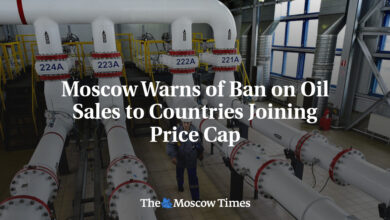
Inflation Is the Least of Our Problems: A Deeper Look
Inflation is the least of our problems. While rising prices are certainly a concern, they pale in comparison to the other, often overlooked, challenges facing our world today. From climate change to political instability, the global landscape is riddled with issues that demand our attention far more urgently than the cost of groceries.
The truth is, inflation is a symptom of a much larger, more complex set of problems. It’s a ripple effect, a consequence of deeper systemic issues that require a holistic approach to address. Focusing solely on inflation without acknowledging these underlying factors is like treating a fever without addressing the underlying infection.
The Economic Landscape
The global economy is currently facing a complex and challenging landscape, marked by a confluence of factors that are impacting individuals, businesses, and governments alike. While inflation has garnered significant attention, it is just one aspect of a broader economic picture.
Several other economic challenges are equally, if not more, pressing, demanding comprehensive and strategic responses.
Global Inflation and its Drivers
Inflation, a persistent increase in the general price level of goods and services, has become a prominent concern globally. Several factors are driving this phenomenon, including:
- Supply Chain Disruptions:The COVID-19 pandemic and geopolitical tensions have disrupted global supply chains, leading to shortages and price increases. The war in Ukraine has significantly impacted energy and food prices, exacerbating supply chain disruptions.
- Strong Consumer Demand:Government stimulus measures and pent-up demand following the pandemic have led to increased consumer spending, putting pressure on prices. This is particularly evident in sectors like travel and hospitality, which have experienced a surge in demand.
- Rising Energy Prices:The global energy crisis, fueled by geopolitical tensions and increased demand, has significantly contributed to inflation. Energy prices have risen sharply, impacting transportation costs, manufacturing, and household budgets.
- Labor Market Dynamics:Labor shortages and rising wages in many countries have also contributed to inflationary pressures. Businesses are passing on increased labor costs to consumers, leading to higher prices.
Beyond Inflation: Other Economic Challenges
While inflation is a significant concern, it is not the only economic challenge facing individuals and societies. Other pressing issues include:
- Rising Interest Rates:Central banks around the world are raising interest rates to combat inflation. This can lead to higher borrowing costs for businesses and individuals, potentially slowing economic growth and increasing the risk of recession. For example, in the United States, the Federal Reserve has aggressively raised interest rates, leading to higher mortgage rates and making it more expensive for businesses to borrow money.
- Food Insecurity:The war in Ukraine, along with climate change and supply chain disruptions, has exacerbated food insecurity globally. Rising food prices and shortages are impacting vulnerable populations, particularly in developing countries. The United Nations’ Food and Agriculture Organization estimates that over 2.3 billion people worldwide face moderate or severe food insecurity.
While inflation is a major concern, it’s not the only issue we need to address. The sheer scale of our national debt is becoming unsustainable, and the consequences of inaction could be far more severe. There’s a growing argument for taking a bold step and potentially risking default on the debt, as outlined in this insightful article the case for risking default on the debt.
We need to prioritize long-term economic stability, even if it means making difficult choices in the short term. Inflation is a symptom, but the underlying disease is a debt crisis that demands a radical cure.
- Climate Change:Climate change is having a significant impact on economies worldwide, leading to more frequent and severe weather events, such as droughts, floods, and heat waves. These events disrupt agricultural production, damage infrastructure, and displace populations. The World Bank estimates that climate change could push over 100 million people into poverty by 2030.
- Debt Sustainability:Many countries are grappling with high levels of public and private debt. Rising interest rates and economic uncertainty are making it more challenging for governments and businesses to manage their debt burdens. This can lead to fiscal crises and limit economic growth.
- Geopolitical Tensions:Geopolitical tensions, such as the war in Ukraine and the ongoing trade war between the United States and China, are creating uncertainty and disrupting global trade and investment flows. These tensions can lead to economic sanctions, supply chain disruptions, and increased volatility in financial markets.
Inflation might be a pain, but it’s hard to focus on the cost of groceries when you’re wondering if the President’s mishandling of classified documents could be a national security threat. The news that archives told to suppress statement on Penn Biden document search Republicans say raises serious questions about transparency and accountability, and it’s a reminder that sometimes, the biggest problems are the ones we can’t see coming.
Inflation might be a constant ache, but this situation has the potential to be a full-blown crisis.
Social and Political Implications
While inflation might seem like the most pressing issue, neglecting other critical challenges could have profound social and political consequences. Ignoring these issues while solely focusing on inflation could exacerbate existing tensions and undermine the very fabric of society. Addressing these challenges is crucial for building a more stable and equitable future.
The Potential for Social Unrest
Failing to address issues like income inequality, lack of access to healthcare, and inadequate education can fuel social unrest. When people feel that their basic needs are not being met, they are more likely to turn to protest and violence.
Sure, inflation might be a headache, but the real issue is the erosion of trust in our financial institutions. With a record exodus of consumer deposits, US banks are scrambling to attract funds by offering enticing deals. This frantic scramble highlights a deeper problem: the lack of confidence in our financial system.
Until we address this underlying issue, inflation will be the least of our worries.
For instance, the recent protests in France, sparked by rising living costs and a sense of economic injustice, highlight the potential for social unrest when people feel unheard and their concerns are ignored.
- Rising inequality can lead to increased crime rates and social unrest as people feel left behind and desperate.
- A lack of access to quality healthcare can exacerbate health disparities and create resentment towards the government.
- Inadequate education systems can limit opportunities for social mobility and create a sense of hopelessness, especially among marginalized communities.
Political Polarization and Instability
Ignoring these critical challenges can also lead to political polarization and instability. When people feel that their concerns are not being addressed, they may become disillusioned with the political system and turn to extremist ideologies. This can lead to the rise of populist movements and a breakdown of trust in democratic institutions.
- The rise of populism and nationalism is often fueled by a sense of economic insecurity and social marginalization.
- Polarization can lead to gridlock in government and make it difficult to address complex issues.
- A breakdown of trust in democratic institutions can make it easier for authoritarian leaders to gain power.
Addressing These Challenges for a More Stable and Equitable Society
Focusing on a holistic approach that addresses these critical challenges alongside inflation is essential for building a more stable and equitable society.
- Investing in social programs like affordable housing, universal healthcare, and quality education can help reduce inequality and create a more just society.
- Promoting policies that encourage economic growth and job creation can provide opportunities for all citizens.
- Strengthening democratic institutions and fostering civic engagement can help rebuild trust and create a more responsive government.
Policy and Action: Inflation Is The Least Of Our Problems
While inflation may be a pressing concern, it’s crucial to recognize that it’s not the only challenge facing economies and societies today. A comprehensive approach to policymaking requires addressing a broader spectrum of issues, from climate change and technological disruption to social inequality and geopolitical instability.
Policy Areas Requiring Immediate Attention
Beyond inflation control, several key policy areas demand immediate attention to foster sustainable and equitable growth. These areas are interconnected and require a holistic approach to address their complex interplay.
Potential Policy Solutions
The following table Artikels potential policy solutions for the identified policy areas, examining their impact, feasibility, and potential challenges:
| Policy Area | Policy Solutions | Impact | Feasibility | Challenges |
|---|---|---|---|---|
| Climate Change | Carbon pricing mechanisms, renewable energy subsidies, green infrastructure investments | Reduced greenhouse gas emissions, transition to a low-carbon economy, improved environmental sustainability | Moderately feasible, requiring significant political will and coordination across sectors | Potential economic disruptions, resistance from fossil fuel industries, challenges in ensuring equitable distribution of benefits |
| Technological Disruption | Investment in education and training programs, fostering innovation ecosystems, promoting responsible AI development | Enhanced workforce skills, creation of new industries and jobs, ethical and responsible use of technology | Moderately feasible, requiring continuous adaptation and investment in research and development | Potential job displacement, concerns about data privacy and security, ethical considerations around AI and automation |
| Social Inequality | Progressive taxation, social safety nets, investments in affordable housing and healthcare | Reduced income inequality, improved access to essential services, greater social mobility | Moderately feasible, requiring political consensus and sustained funding | Potential resistance from high-income earners, challenges in ensuring program effectiveness and accessibility |
| Geopolitical Instability | Diplomacy and conflict resolution, strengthening international institutions, promoting global cooperation | Reduced risk of conflict, improved global security, enhanced economic stability | Highly challenging, requiring significant diplomatic efforts and trust-building measures | Geopolitical tensions, competing national interests, challenges in coordinating responses across countries |
Examples of Policy Responses, Inflation is the least of our problems
- The European Union’s Emissions Trading System (EU ETS) is an example of a successful carbon pricing mechanism that has contributed to a reduction in greenhouse gas emissions in the region. However, it has faced challenges in achieving its full potential due to concerns about its impact on competitiveness and the need for greater enforcement mechanisms.
- The US government’s investment in the Apollo space program in the 1960s is a notable example of a successful policy response to technological disruption. It spurred significant innovation in fields such as aerospace engineering, computing, and materials science, creating new industries and jobs.
However, the program was expensive and required a significant commitment from the government.
- The UK’s National Health Service (NHS) is an example of a successful social safety net that provides universal healthcare coverage to its citizens. However, it faces challenges in maintaining affordability and ensuring quality of care amidst growing demand and budget constraints.
- The United Nations’ efforts to promote peace and security through diplomacy and conflict resolution are examples of successful policy responses to geopolitical instability. However, these efforts often face significant obstacles due to the complexity of global politics and the difficulty of achieving consensus among nations.
Individual Impact

Beyond the immediate impact of inflation on purchasing power, these challenges have far-reaching consequences for individuals, impacting their lives in various ways. The ripple effects extend beyond the cost of goods and services, influencing financial security, mental well-being, and overall quality of life.
Impact on Financial Security
The economic challenges individuals face can significantly impact their financial security. The rising cost of living, coupled with stagnant wages, can erode savings, making it difficult to meet basic needs. This can lead to increased debt, delayed retirement plans, and difficulty in building a financial safety net.
For example, a family struggling to make ends meet might have to rely on credit cards to cover essential expenses, leading to a cycle of debt.
Impact on Mental Well-being
The stress of economic uncertainty and financial hardship can have a significant impact on mental well-being. Concerns about making ends meet, job security, and the future can lead to anxiety, depression, and other mental health issues. This can further impact an individual’s ability to cope with daily life and achieve their goals.
For instance, a person facing financial difficulties might experience increased stress and anxiety, affecting their sleep, concentration, and overall health.
Impact on Quality of Life
The economic challenges can also impact individuals’ overall quality of life. Limited access to healthcare, education, and recreational activities can result from financial constraints. This can lead to a decline in overall well-being and limit opportunities for personal growth and development.
For example, a family struggling financially might have to make difficult choices, such as foregoing healthcare appointments or educational opportunities for their children, impacting their overall well-being.
Individual Actions to Address the Challenges
Individuals can take proactive steps to mitigate the impact of these challenges on their lives. These actions include:
- Budgeting and Saving:Creating a realistic budget and practicing responsible saving habits can help manage finances effectively, even in challenging economic times.
- Financial Literacy:Understanding personal finance principles, such as budgeting, investing, and debt management, can empower individuals to make informed financial decisions.
- Upskilling and Reskilling:Investing in education and training to enhance skills and knowledge can increase employability and earning potential.
- Seeking Support:Reaching out for support from family, friends, or professional organizations can provide guidance and resources during difficult times.
Closing Summary
The world is facing a multitude of interconnected challenges, and inflation is just one piece of the puzzle. We need to move beyond the singular focus on rising prices and recognize the urgency of addressing the larger, more systemic issues that are impacting our lives.
It’s time to acknowledge the bigger picture, and to prioritize solutions that will create a more sustainable and equitable future for all.





